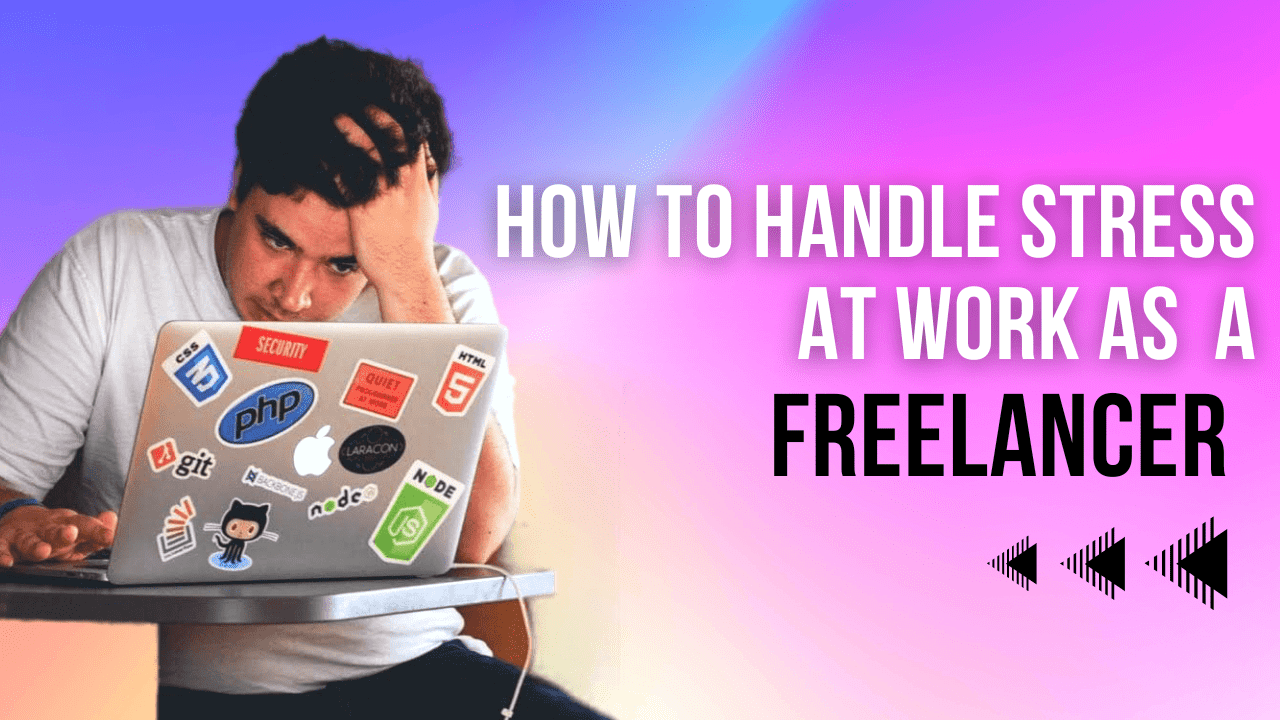Have you ever wondered what an Ideal day in the life of a successful freelancer entails?
Many people are unsure of what an ideal day in a freelancer’s life looks like and are in mental anguish.
We have carefully curated this daily schedule for you, which will help to maintain a decent work-life balance necessitates. Read this advice attentively before putting together a plan that works for you and keeps you from freelance burnout.
Moreover, a flexible schedule for a freelancer will help enhance your productivity.
Over and above, we’ve seen how crucial mental health is for freelancers to maintain their sanity. A schedule is therefore essential for planning all of the day’s activities and allowing time for leisure and short pauses. It’s time for freelancers who are frequently or are experiencing symptoms of burnout to create a timetable, which will not only help them overcome burnout but also offer them mental serenity.
Let’s get started.
Why Do Freelancers Require A Routine?
The most obvious advantage of freelancing is the independence it provides. You must be disciplined in order to reach this freedom.
A routine, timetable, or plan—whatever you want to call it—gives structure to your ideal day. This structure not only assists you in completing your tasks but also assists you in maintaining a healthy work-life balance.
Let’s look at four compelling arguments.
- Gives Your Day Structure
When you work for yourself, you have complete control over your schedule. This is fantastic, but it may also be difficult. Creating a daily routine gives your day more structure and predictability. You don’t have to figure out what to do every morning; it’s already determined. All you have to do now is finish it.
- Helps You Avoid Procrastinating
Days can feel endless if there isn’t a defined routine in place. It also gives you the impression that you have all the time in the world to do your tasks. A daily routine establishes boundaries and guarantees that you make the most of your time.
- Reduces Stress And Increases Concentration
Because you’re constantly thinking about when you’ll get things done, having no schedule can be mentally tiring and frustrating. Our capacity to focus suffers as a result of being unorganized. All of this adds up to a decrease in overall productivity.
- Encourages A Healthy Work-Life Balance
It isn’t all about the job. Being disciplined in your daily routine allows you to fit in everything else that is important to you. Monday through Friday, you usually work set hours.
Moreover, you don’t work weekends and take advantage of the time off.
A schedule establishes boundaries, allowing you to spend your free time with family, exercising, pursuing a hobby, or doing anything else that makes you feel more balanced.
How to Create Your Own “Perfect Ideal Day” Routine?
Everyone has their own version of an ‘Ideal Day,’ which is a day that combines everything that is essential to them. Obviously, this includes employment, but it also includes other aspects of your life.
When it comes to building your own schedule as a freelancer, the Ideal Day method is worth considering. In this manner, you ensure that your task is completed while also ensuring that you maintain a sense of balance.
Begin by picturing your Ideal Day.
- What would you do with your free time?
- What is included in it? (For example, self-care)
- What does it leave out? (e.g. stress)
Keep track of what comes up.
We feel that freelancing allows us to live out our Ideal Day every day. As a result, we devised a perfect daily schedule, taking into account all aspects of a freelancer’s life. It isn’t always perfectly balanced, but at the very least, it makes you more conscious of making time for everything that is important to you.
Here are some additional suggestions to assist you in creating your Ideal Day.
- Make A List Of Non-Negotiables
Begin with your non-negotiables or the things you want to include in your daily routine. You might also refer to these as your daily priorities.
A healthy diet, exercise, family/relationships, reading, and adequate sleep, for example, are daily non-negotiables for you.
Work is crucial, but these non-negotiables are just as important. They actually help you become better at what you do and increase your productivity.
- Decide On A Start And End Time
No, you don’t have to work from 9 a.m. to 5 p.m. any longer. Most freelance professionals, on the other hand, work scheduled hours. This, once again, gives your day structure and allows you to make the most of your productive time.
You don’t have to work early in the morning if you don’t want to, but it will help you be more productive. Choose start and finish hours that are convenient for you, and schedule your time accordingly.
- Take Frequent Pauses
It is entirely up to you when and how often you take your breaks, as well as what you do during them, but make sure to incorporate them into your regular routine. You’ll be less productive and burn out sooner if you don’t take enough breaks.
During these breaks, you can do something that makes you happy and gives you more excited about working like playing FreeCell or solving puzzles. It will improve different cognitive functions like memory, and problem-solving, as well as help in increasing productivity.
Check out these 6 smart ways to boost your productivity.
Take a mid-morning meditation break and don’t eat lunch at your desk, for example. If your mind is full, take random breaks to stare out the window, read, or simply hang out the clothes.
- Set Limits With Your Family And Friends
While attitudes are shifting, you may discover that some of your friends or family members regard your new freelancing business as “fun employment,” rather than “work.”
Setting firm boundaries is the best and only method to deal with it. Say no to last-minute catch-up invites, unexpected favor requests, or drop-in visits in the midst of the day. Yes, your work is flexible, but that does not negate the fact that you must work.
Having a fixed schedule might be really beneficial in this regard. It won’t be easy, and you might have to have a few uncomfortable chats along the way.
Don’t be concerned about offending someone. When it comes to setting expectations about when you’ll be available, be nice but firm. Make your work and your personal timetable a priority. Others will take you and your work seriously if you take yourself and your work seriously.
- Make Time For Yourself
Don’t forget to look after yourself as well. Self-care could be as simple as getting a massage or going for a solo run. It could be meditating or simply spending time alone.
It’s easy to become engrossed in your work, all of the time, particularly if you’re new to freelancing. However, it’s critical not to lose sight of the freedom and flexibility that drew you to freelancing in the first place. Don’t overwork yourself to the point of exhaustion.
Self-care makes you a more effective and productive employee.
- Create A Schedule That Works For You
Finally, do what you think is best for you. Some of us thrive on deadlines, while others find them exhausting. Make a timetable that is beneficial to you.
We’ve talked about the advantages of having a schedule, but it doesn’t have to be rigid if you don’t want it to be. A simple outline of your day could be included in your schedule. Others may only have a rudimentary to-do list.
Some of us prefer to work in the morning, while others prefer to work in the afternoon or at night.
To stay productive, we recommend long stretches of “flow” work before taking a break, although others may choose to take breaks more frequently.
Adjust your schedule as needed.
4 Habits To Schedule In Your Ideal Day Plan
A productive freelancer is usually a happy and healthy freelancer. Making sure your mind and body are in good shape is an important element of being productive as a freelancer. When you’re in good physical and mental shape, it’s normal for your focus and productivity to improve. One way to help maintain this balance is by using effective planner templates. These templates can assist you in organizing your tasks, setting priorities, and managing your time efficiently.
- Do some exercise
Regular exercise has several health benefits for both our bodies and our thoughts. Physical activity causes a rise in heart rate, which pumps more oxygen to the brain.
What you should do: Schedule 45 minutes of walking, running, doing trampoline workout, cycling, or swimming each day – or every other day – before sitting down to work. It doesn’t matter what you’re doing as long as you’re out of breath and your muscles are exhausted.
- Make a nutrient-dense diet
The food we eat can have a significant impact on our concentration and energy levels.
What you should do: Conduct research and devise a healthy eating strategy. Every workday, plan what you’ll eat and when you’ll consume it. Purchase healthful products at the beginning of each week and prepare nutritious meals that promote mental focus, emotional balance, and physical health.
- Take frequent, brief breaks
Our brains are incapable of focusing on a single task for long periods of time. We need to take regular intervals to rejuvenate and refocus our minds in order to make the most of these periods of ultra-concentration.
What you should do: Set a timer for 45 to 60 minutes and take a 10- or 15-minute break every 45 to 60 minutes. Focus on something completely different from the prior work task during these breaks. Make a cup of coffee, do some simple exercises, or go for a short walk.
If you’re experiencing isolation and aren’t sure how to deal with it, read this article and find a solution to your problem.
- Limit your use of social media
Social networking sites can be terrific marketing and learning tools, but if you become addicted to checking for new messages and updates, it can disrupt your attention, productivity, and energy levels.
To do: Make a schedule for checking and updating your social media channels. Maybe only twice a day, for less than 15 minutes each time. Using specialized tools, you can schedule status updates in advance.
Recommended Reads: Top Invoicing Software For Consultants
Let’s Get Into A Freelancer’s Ideal Day
Let’s start with a day in the life of a freelancer. We curated this plan for you to enhance your productivity after interviewing at least 50 freelancers.
Remember that your ideal day will not be the same next month or even next week. This is a guide to maintaining a balance in your life while also excelling in your freelance career. If you succeed in creating a schedule for yourself, you will undoubtedly boost your productivity and achieve a suitable work-life balance.
Ideal Day Plan illustration of a freelancer.
| Timings | Activity |
| 6:30 | Wake up and Go for Walk or Gym |
| 8:00 – 12:00 | Morning work sessions |
| 12:00 | Lunch Break |
| 13:00 – 16:00 | Afternoon Work Session |
| 16:00 – 17:00 | Finish all today’s task |
| 17:30 – 18:00 | Evening walk or meditation |
| 19:30 – 21:00 | Winding down and Dinner |
| 21:00 – 22:00 | Make tomorrow’s work schedule |
| 22:00 | Reading in bed |
In Action, My ‘Ideal Day’ plan
Since you requested it, here’s the detailing of an ideal Thursday in life as a freelancer.
6:30 – Get Up And Take A Walk
I push snooze when the alarm goes off, but then I remember you’re keeping an eye on me today, so I get out of bed. Even though I am a morning person, getting out of bed is always a struggle!
I brush my teeth, dress up, eat a banana, and go for a walk in the yard. It’s a lovely, slightly cold day. To warm up, I buy a cup of coffee along the road.
Over the last few of years, I’ve started including a walk, a bike ride, or at the very least just getting outside into my everyday routine. When I do that, I find I’m considerably more productive and less stressed.
“Generally, research shows that when people are exposed to the natural environment and natural features, they have a lower stress reaction,” according to the BBC. When you’re out in nature, your blood pressure drops, your heart rate variability improves, and your mood improves.”
8:00 to 12:00 – Morning Work Sessions
I check my diary first thing in the morning to see what I have planned for the day previous night. I promptly check my email after that.
Although many productivity experts advise against checking email first thing in the morning, I find it to be effective. I like to check to make sure I’m not missing anything vital.
As you can see, I prefer to get to work early. It also means I can finish earlier, giving me more time at the end of the day to cook, exercise, and do anything else I choose.
10:30 – Short Meditation Break
I meditate and re-energize during a quick mid-morning break. This is a new thing I’ve been experimenting with and really like. I find it difficult to meditate first thing in the morning, so this regimen is much more effective for me and re-centers me for the rest of the day.
12:00 – Lunch Break
I normally stick to salads with lots of green leafy vegetables and a high-protein diet. Since my instructor has instructed me to do so. My partner works from home, so we normally eat lunch on the terrace and catch up on our days.
13:00 to 14:00 – Afternoon Work Session
It’s back to work after lunch. I’ll be honest, it’s Thursday, and I’m starting to feel lazy. Instead of a second cup of coffee, sometimes I brew myself green tea. However, today is not that day.
I sit down on the couch with my laptop and work for a few hours (posture be dammed). See, I warned you that things aren’t always as they seem.
Around 15:30, I noticed that my attention was dwindling and that I didn’t have the mental capacity to continue writing creatively. So I call it a day and get to work on some tedious business admin tasks that I’ve been putting off.
17:30 to 18:00 – Evening Walk
Since my partner and I finished work at the same time, we went for a walk and talked about how hectic or easy our days were. This is the time when we discuss significant issues, and on our way home, we stop to pick up any groceries or other necessities.
19:30 to 21:00 – Dinner And TV
We cook dinner together while also watching TV shows and drinking nice wine to unwind and enjoy our time. We occasionally invite friends or family members around for dinner.
21:00 – Prepare A To-Do List For The Next Day
We return to our room after winding everything up. I prepare a list of priorities for the next day and return my laptop to my office desk at the end of the day. It helps me stay more organized the next day, and because it is serene and peaceful at night, it allows me to concentrate more effectively.
22:00 – Relaxing In Bed
By 9:30 p.m., I’m usually in bed. To ensure that I can maintain such early wake-up times, I go to bed early.
I brew a cup of caffeine-free tea or have desserts occasionally, watch a series/movie, do skin care, and prepare for bed. I also read for around 30 minutes before becoming too exhausted to continue and falling asleep.
So there you have it—a day in the life of a freelancer from start to finish.
I attempt to stick to my ‘Ideal Day’ framework in general, but not every day is great. In my early days of freelancing, I had to go through a lot of trial and error to develop a routine that worked for me. I can’t imagine my life without one now.

Conclusion
Freelancing allows you to be more independent. More people are looking for a job that allows them to have a better work-life balance and a more flexible lifestyle as the way we work continues to change around us.
With this information, we hope you are able to design your ideal daily routine. Healthy and energetic habits for freelancers entail more than just getting some exercise and eating well. They also entail making significant advancements in your professional growth and time management.
Make it a habit to look for ways to optimize your work procedures at all times. This will allow you to spend more time exercising, enjoying nature, preparing wonderful healthy meals, spending time with loved ones, and, finally, relaxing and recharging.
Take the first step toward a more flexible lifestyle. If a free lifestyle appeals to you, get started with freelancing by creating your freelance profile on Refrens today.

















